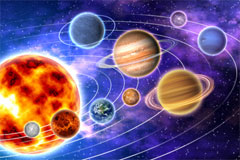 The theory that the universe began in a state of extremely high density and has been expanding since some particular instant that marked the origin of the universe. The big bang is the generally accepted cosmological theory; the incorporation of developments in elementary particle theory has led to the inflationary universe version. The predictions of the inflationary universe and older big bang theories are the same after the first 10−35 s. See also Inflationary universe cosmology.
The theory that the universe began in a state of extremely high density and has been expanding since some particular instant that marked the origin of the universe. The big bang is the generally accepted cosmological theory; the incorporation of developments in elementary particle theory has led to the inflationary universe version. The predictions of the inflationary universe and older big bang theories are the same after the first 10−35 s. See also Inflationary universe cosmology.
Two observations are at the base of observational big bang cosmology. First, the universe is expanding uniformly, with objects at greater distances receding at a greater velocity. Second, the Earth is bathed in the cosmic background radiation, an isotropic glow of radiation that has the characteristics expected from the remnant of a hot primeval fireball.
Tracing the expansion of the universe back in time shows that the universe would have been compressed to infinite density approximately 8–16 × 109 years ago. In the big bang theory, the universe began at that time as a so-called big bang began the expansion. The big bang was the origin of space and time.
In 1917, Albert Einstein found a solution to his own set of equations from his general theory of relativity that predicted the nature of the universe. His universe, though, was unstable: it could only be expanding or contracting. This seemed unsatisfactory at the time, for the expansion had not yet been discovered, so Einstein arbitrarily introduced a special term—the cosmological constant—into his equations to make the universe static. The need for the cosmological constant seemed to disappear with Hubble’s discovery of the expansion, though the cosmological constant has subsequently reappeared in some models.
Further solutions to Einstein’s equations, worked out in the 1920s, are at the basis of the cosmological models that are now generally accepted. These solutions indicate that the original “cosmic egg” from which the universe was expanding was hot and dense. This is the origin of the current view that the universe was indeed very hot in its early stages.








Comments are closed.